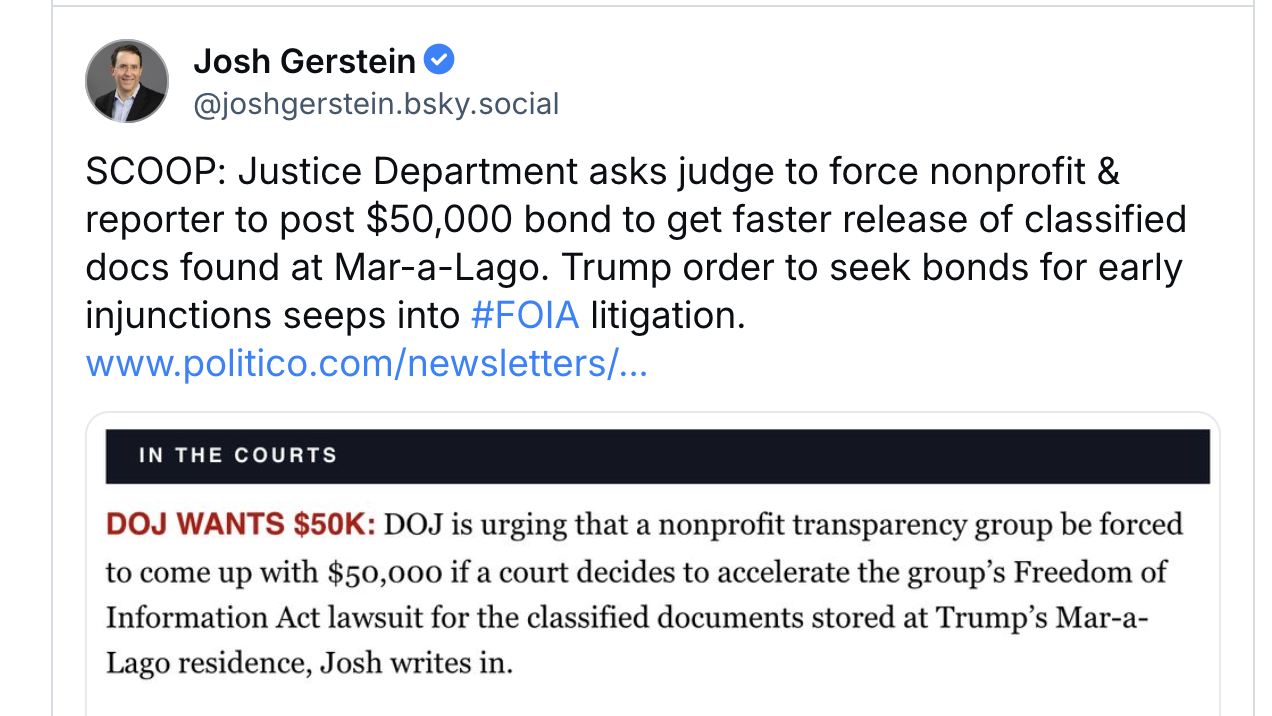President Donald Trump’s “most transparent administration in history!” is closing Freedom of Information Act offices, firing FOIA officials who have released embarrassing information, and risking worsened FOIA delays if there is a government shutdown.
So how is Trump’s Justice Department, which is tasked with ensuring government-wide FOIA compliance, responding when requesters sue for timely access to government records?
By demanding they pay $50,000.
Here’s what you need to know about this outrageous development.
FOIA isn’t free
Despite the name, FOIA isn’t free (although certain requesters do qualify for reduced fees, especially if agencies miss their processing deadlines).
Fee bullying isn’t a new problem, either. Agencies routinely demand requesters pay exorbitant sums to discourage them from pursuing their requests.
The Drug Enforcement Administration once famously told a FOIA requester that it would cost nearly $1.5 million to produce documents about Mexican cartel boss “El Chapo.”
In another instance, the Army tried to charge $300,000 to release the results of water tests performed at military facilities.
The list goes on.
A 20-day response becomes hundreds
Fee woes are made worse by delays.
FOIA requires agencies to substantively respond to requests within 20 days, with limited exceptions that allow agencies to delay a decision by another 10 days.
Agencies nearly always miss their deadlines — sometimes by years.
The most recent data available shows that it takes the U.S. Central Command an average of 1,011 days to process complex FOIA requests, the Department of State needs roughly 564 days, and U.S. Immigration and Customs Enforcement takes around 210 days. (FOIA has two processing tracks: simple and complex. Many agencies label their requests complex even when they are straightforward and narrow, in an effort to make long processing times more palatable.)
Expedited processing still takes years
FOIA does allow requesters to ask for expedited processing when the request is urgent.
Unsurprisingly, agencies often deny these requests.
But even if an agency does grant expedited processing, it can take years.
The Justice Department granted Freedom of the Press Foundation (FPF) expedited processing for the legal memo justifying the Trump administration’s acceptance of Qatar’s $400 million luxury jet — then told us it would still take 620 days to release it.
We had to sue and are still waiting.
That’s not an isolated incident. The National Security Agency needed 1,827 days to release records that had been granted expedited processing.
A fast-tracked Defense Department inspector general request still took 1,119 days.
And the Census Bureau needed 982 days to complete an expedited release.
When suing is the public’s only hope
It’s unsurprising that more FOIA requesters are suing the government over absurd wait times, especially for records that are time sensitive.
Suing isn’t a casual decision. It’s already time and resource intensive — and the Trump administration is trying to make it even more so.
The Justice Department recently asked a federal court to force the James Madison Project and journalist Brian Karem to post a $50,000 bond if the court expedited their request for information about the classified documents Trump stole from the public and unlawfully took to Mar-a-Lago.
The judge should turn the Justice Department down.
But even if the Justice Department is rebuffed in this case, it will likely try again.
Lawyers should be ready to argue against these claims. Advocacy groups that file FOIA suits for the public good should expand their litigation budgets.
And members of Congress should demand the Justice Department appear for a hearing and explain why it’s OK for agencies to take nearly 2,000 days to fulfill even fast-tracked requests, yet requesters must pay $50,000 to have information released.
Time for FOIA pay-to-play to die away.





